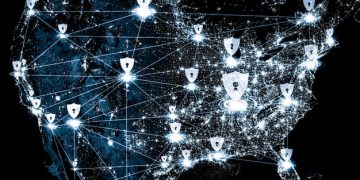Cybersecurity for Political Figures: Adapting to Modern Threats

Political figures are increasingly targeted by sophisticated cybersecurity threats, necessitating advanced strategies to protect their communications and sensitive data from breaches and manipulation.
The digital age has transformed political communication, but it has also opened doors to unprecedented cybersecurity risks. Political figures are prime targets, requiring robust defenses against ever-evolving threats. Let’s explore how they are adapting to stay secure.
Understanding the Escalating Cybersecurity Threats
Political figures face a unique set of cybersecurity challenges due to their high-profile nature and the sensitive information they handle. Understanding these threats is the first step in building a robust defense.
Common Threat Vectors
Several attack methods are frequently used against political figures, exploiting vulnerabilities in their digital infrastructure and personal habits.
- Spear phishing: Targeted emails designed to trick individuals into revealing sensitive information.
- Malware and ransomware: Programs that can encrypt data or steal information from infected devices.
- Social media attacks: Impersonation, disinformation campaigns, and account takeovers.
- Data breaches: Unauthorized access to databases containing personal and political information.
These threats are constantly evolving, demanding continuous vigilance and adaptation.
The Impact of Successful Cyberattacks
The consequences of a successful cyberattack on a political figure can be far-reaching, impacting not only the individual but also national security and public trust.
- Reputational damage: Leaked emails and sensitive documents can tarnish a politician’s image.
- Financial loss: Ransomware attacks can cripple campaigns and organizations.
- Compromised communications: Unauthorized access to communications can expose strategies and plans.
- Electoral interference: Disinformation campaigns can manipulate public opinion and influence election outcomes.
Given these potential impacts, political figures must prioritize cybersecurity and implement comprehensive measures to protect themselves and their constituents.

In conclusion, understanding the types of cybersecurity threats and their potential impacts is crucial for political figures to prioritize and implement effective preventive measures.
Implementing Multi-Factor Authentication (MFA)
Multi-factor authentication (MFA) adds an extra layer of security to digital accounts, making it significantly harder for hackers to gain unauthorized access. It’s a vital tool for political figures to protect their online presence.
What is Multi-Factor Authentication?
MFA requires users to provide two or more verification factors to access an account. These factors can include:
- Something you know: A password or PIN.
- Something you have: A smartphone with an authenticator app.
- Something you are: Biometric data, such as a fingerprint.
Even if a hacker manages to obtain a password, they will still need the other factors to gain access.
Setting Up MFA on Key Accounts
Political figures should enable MFA on all critical accounts, including email, social media, banking, and campaign management platforms. Here’s how:
- Enable MFA in account settings: Most major platforms offer MFA options within their security settings.
- Use authenticator apps: Apps like Google Authenticator or Authy generate time-based codes for verification.
- Consider hardware security keys: These physical devices provide an extra layer of security for highly sensitive accounts.
Regularly review MFA settings and ensure all devices used for authentication are secure.
In summary, implementing MFA across all key accounts is a fundamental step in enhancing the cybersecurity posture of political figures, adding significant protection against unauthorized access.
Securing Communication Channels
Political figures rely heavily on digital communication, making it crucial to secure these channels against eavesdropping and data breaches. Using encrypted messaging apps and secure email services are essential practices.

Encrypted Messaging Apps
Encrypted messaging apps provide end-to-end encryption, ensuring that only the sender and recipient can read the messages. Popular options include:
- Signal: Widely regarded as one of the most secure messaging apps, Signal is open-source and uses advanced encryption protocols.
- WhatsApp: While owned by Facebook, WhatsApp offers end-to-end encryption for all messages by default.
- Telegram: Offers both encrypted “secret chats” and regular chats, with the option to enable end-to-end encryption in secret chats.
Political figures should encourage their staff and contacts to use these apps for sensitive communications.
Secure Email Services
Regular email services are often vulnerable to interception and hacking. Secure email services provide encryption and other security features to protect email communications.
- ProtonMail: Based in Switzerland, ProtonMail offers end-to-end encryption and zero-access encryption, ensuring that even ProtonMail cannot read your emails.
- Tutanota: A German-based secure email provider that offers end-to-end encryption and a focus on privacy.
- StartMail: A Dutch-based secure email service that offers PGP encryption and a user-friendly interface.
Political figures should adopt secure email services for sensitive communications and train their staff on proper usage.
Best Practices for Secure Communication
In addition to using encrypted apps and services, political figures should follow these best practices:
- Verify identities: Confirm the identity of contacts before sharing sensitive information.
- Use strong passwords: Create complex and unique passwords for all accounts.
- Avoid public Wi-Fi: Use secure networks or VPNs when accessing sensitive information.
Securing communication channels is vital for maintaining confidentiality and protecting sensitive information.
In conclusion, securing communication channels with encrypted messaging apps and secure email services, coupled with adherence to best practices, is essential for political figures to safeguard their sensitive information from potential breaches.
Training Staff on Cybersecurity Awareness
Even with the best technology in place, human error can still lead to cybersecurity breaches. Training staff on cybersecurity awareness is crucial to create a culture of security and minimize risks.
The Importance of Cybersecurity Training
Effective cybersecurity training should cover a range of topics, including:
- Phishing awareness: Recognizing and avoiding phishing emails and scams.
- Password management: Creating and managing strong passwords.
- Data security: Protecting sensitive information and following data security protocols.
- Device security: Securing laptops, smartphones, and other devices.
Regular training sessions can help staff stay informed about the latest threats and best practices.
Creating a Cybersecurity Culture
To foster a strong cybersecurity culture, political figures should lead by example and promote awareness throughout their organizations. This includes:
- Implementing clear security policies
- Encouraging open communication about security concerns
- Providing ongoing training and resources
By creating a culture of security, political figures can empower their staff to become active participants in protecting sensitive information.
In summary, investing in comprehensive cybersecurity training for staff and fostering a culture of security awareness can significantly reduce the risk of human error, enhancing overall cybersecurity effectiveness.
Regular Security Audits and Assessments
Regular security audits and assessments are essential for identifying vulnerabilities and ensuring that cybersecurity measures are up-to-date. These assessments help political figures stay ahead of evolving threats.
What is a Security Audit?
A security audit is a comprehensive review of an organization’s security policies, procedures, and technologies. It typically involves:
- Vulnerability scanning: Identifying weaknesses in systems and networks.
- Penetration testing: Simulating cyberattacks to test security defenses.
- Policy review: Evaluating the effectiveness of security policies and procedures.
- Compliance assessment: Ensuring compliance with relevant regulations and standards.
The results of a security audit can help identify areas for improvement and prioritize security investments.
Choosing the Right Security Partner
Selecting a reputable and experienced security partner is crucial for conducting effective audits and assessments. Look for a partner that:
- Has a proven track record: Check references and reviews.
- Understands the political landscape: Experience working with political organizations is beneficial.
- Offers comprehensive services: Ensure the partner can provide a wide range of security services.
A trusted security partner can provide valuable insights and recommendations.
In summary, conducting regular security audits and assessments with a trusted partner is crucial for political figures to proactively identify vulnerabilities, address security gaps, and stay ahead of evolving cybersecurity threats.
Staying Informed About Emerging Threats
Cybersecurity is a constantly evolving field, and political figures must stay informed about emerging threats to protect themselves and their constituents. Continuous learning and monitoring are essential.
Following Cybersecurity News and Trends
Staying informed about the latest cybersecurity news and trends can help political figures anticipate and prepare for emerging threats. Resources include:
Leveraging Government and Industry Resources
Government agencies and industry organizations offer valuable resources and guidance on cybersecurity. Some key sources include:
- The Cybersecurity and Infrastructure Security Agency (CISA): Provides alerts, advisories, and resources for organizations of all sizes.
- The National Institute of Standards and Technology (NIST): Develops cybersecurity standards and best practices.
By leveraging these resources, political figures can stay informed about the latest threats and best practices.
In closing, staying informed about emerging threats through continuous learning and leveraging government and industry resources is critical for political figures. This proactive approach ensures they can adapt their security measures and protect themselves and their constituents effectively.
| Key Point | Brief Description |
|---|---|
| 🛡️ MFA Implementation | Enabling multi-factor authentication on all critical accounts for added security. |
| ✉️ Secure Channels | Using encrypted messaging apps and secure email services for sensitive communications. |
| 👨🏫 Staff Training | Providing awareness training to staff to minimize human errors and improve security. |
| 🔍 Security Audits | Conducting regular audits to identify vulnerabilities and ensure up-to-date security measures. |
FAQ
▼
Spear phishing involves targeted emails designed to trick individuals into revealing sensitive information or clicking on malicious links. These emails often appear to be from a trusted source, making them particularly dangerous.
▼
MFA adds an extra layer of security, making it significantly harder for hackers to gain unauthorized access to accounts, even if they have a password. This protects against reputational damage and data breaches.
▼
Several apps offer end-to-end encryption, including Signal, WhatsApp, and Telegram (in “secret chats”). These apps ensure that only the sender and recipient can read the messages.
▼
Training should cover phishing awareness, password management, data security protocols, and device security. Regular training sessions help staff stay informed and proactive about potential threats.
▼
Security audits should be conducted regularly, at least annually, to identify vulnerabilities and ensure that cybersecurity measures are up-to-date. More frequent audits may be necessary depending on the risk level.
Conclusion
In the face of escalating cybersecurity threats, it is imperative that political figures prioritize and implement robust security measures. By understanding the threat landscape, implementing MFA, securing communication channels, training staff, conducting regular audits, and staying informed, political figures can protect themselves, their constituents, and the democratic process from cyberattacks.





